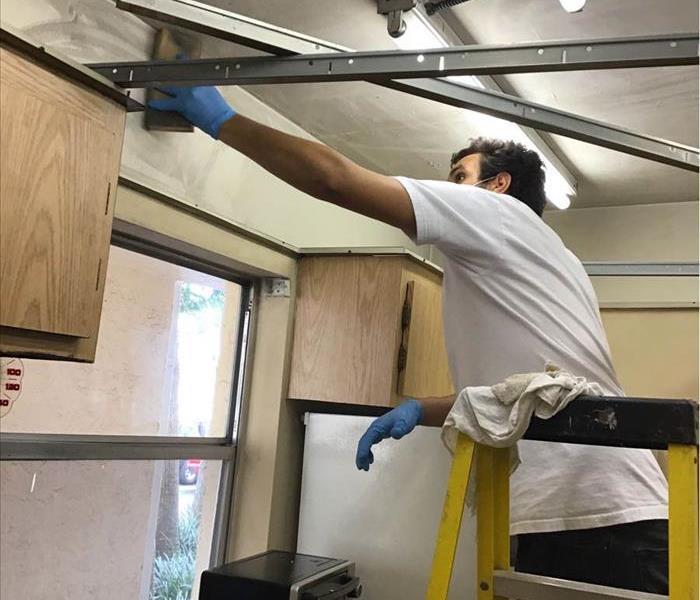Does Your Home Have Smoke Alarms? Should It?
12/9/2022 (Permalink)
Smoke alarms are a necessary part of any home. However, not everyone knows how they work, what they need to do to maintain them, and when they should get them. In this article, we'll cover all of that and more!
What is a smoke alarm?
Smoke alarms are devices that detect smoke. When they detect the presence of smoke, they sound an alarm to alert you and your family members to danger. Smoke alarms can be battery-powered or hardwired into your home's electrical system; this is known as hardwired with battery backup. Some models have a low-battery chirp that will notify you when the batteries need replacing.
If you have a wired or hardwired smoke detector, it is recommended that you test it yearly to ensure it's working properly and has enough power for when it counts.
How does a smoke alarm work?
Smoke alarms work by detecting smoke in the air, which is why you want them to be located near a door or window. The sensor sends an electric current through a wire coil and interrupts the flow of electricity if it detects any kind of particle in the air (like smoke). This interruption triggers an alarm sound, which will warn you that there's danger nearby.
A battery backup is also standard on most models because they tend to go off when they're not supposed to—like when you burn toast! The battery backup ensures that your smoke detector doesn't run out of power while you're sleeping or working away from home.
Is it required to have smoke alarms in my home?
No, it is not required to have smoke alarms in your home. However, we highly recommend that you do so because it can save your life and the lives of your family members. The best thing you can do is check with your local fire department or fire safety codes to find out what kind of smoke alarms are required in your area.
If you don’t know what kind of smoke alarms to get, speak with an expert at a local hardware store or call the fire department for more information on this matter before purchasing any devices!
What types of smoke alarms are available?
There are three primary types of smoke alarms available: ionization, photoelectric, and dual sensor.
- Ionization Smoke Alarms: These work by sensing airborne particles that ionize in the presence of heat or flame. This type of alarm is often the least expensive option but has a shorter lifespan than other types of smoke detectors.
- Photoelectric Smoke Alarms: These detect smoke via light beam sensors that measure changes in light intensity caused by particles in the air—similar to how lasers work. You must have at least one photoelectric device installed if you have pets because they produce more dust than humans do while they sleep on your bedding at night! Photoelectric devices are also more sensitive to smoldering fires than ionization models, making them ideal for detecting slow smoldering embers before they become major blazes like an out-of-control pile of leaves or trash cans close to your home.
What is the ideal number of smoke detectors for a home?
The number of smoke detectors you need depends on the size of your home. Larger homes require more units, while smaller homes may be able to get by with less.
The number of smoke detectors you need also depends on the type of smoke detectors you have. Some models can sense multiple types of fires and alert you accordingly, which can be useful if there are different threats in your home (such as a kitchen fire vs an attic fire).
The National Fire Protection Association recommends that every home should have at least one working smoke alarm on every level of the house, including the basement and any attached garage. They also recommend replacing your alarms every 10 years to ensure they are working properly and can alert you in the event of an emergency.



 24/7 Emergency Service
24/7 Emergency Service
